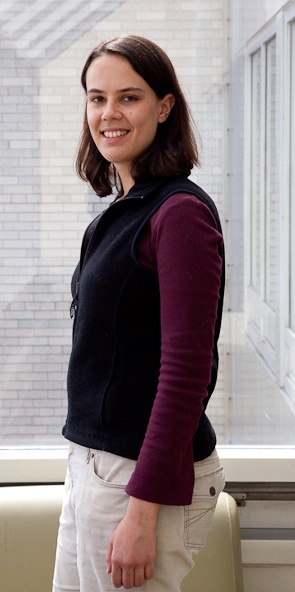Community Profiles
Cynthia Kinnan '10

"Beyond theory—you have to live it."
Economics Doctoral Student
J-PAL Field Work in India
Development economics goes way beyond theory: you have to live it, says Cynthia Kinnan, a fourth-year doctoral student in the Jameel Abdul Latif Poverty Action Lab.
Kinnan lived her research two summers ago, when she oversaw a household-by-household survey evaluating the impact of a microfinance program in Hyderabad, India. A 2007 summer fellowship from the Lab, known as J-PAL, allowed Kinnan to travel and work on the survey with J-PAL co-founders Abhijit Banerjee and Esther Duflo, both professors of economics, and J-PAL director Rachel Glennerster.
Effective Poverty Relief Policy
J-PAL is renowned for its innovative approach to gauging the on-ground effectiveness of development assistance. Its members pioneered economists’ use of randomized trial methods, similar to methods used to test drugs and vaccines, to evaluate interventions in such areas as health and education. The process combines sophisticated economic data analysis with careful local surveys like the one Kinnan administered in Hyderabad for J-PAL's Microfinance Evaluation Project.
Learning from Hyderabad
“Going to Hyderabad made me appreciate fully how difficult and important it is to conduct careful surveys so the data is as complete and accurate as possible. We worked on making sure the questions were easy to understand–few households were familiar with concepts like ‘interest rates’,” she says.
J-PAL’s evaluation of Spandana, Hyderabad's large microfinance institution, is the first such large-scale study, Kinnan says. The J-PAL team is currently analyzing data to discover which households borrow money from the city’s largest microfinance institution and how that affects their use of traditional strategies, such as gifts or loans among families and friends, to cope with negative events.
Combining Theory and Experiments
“What’s most exciting to me about J-PAL is the combination of cutting-edge economic theory with carefully done randomized experiments. This makes it possible to answer questions that neither theory nor experiments alone could answer,” says Kinnan.
J-PAL benefits from and can contribute to MIT’s engineering and technology expertise as they are applied in the developing world, Kinnan says. As new technologies are developed, J-PAL economists can test their implications by asking, Are they cost-effective? Who will benefit most? Are there people in the society who will lose if we introduce these technologies? If so, how can we mitigate this impact?
Inspired
In summer 2009, just two years after her fellowship work in Hyderabad, Kinnan will live development economics again, conducting a J-PAL randomized experiment in Karnataka, an Indian state bordered by the Arabian Sea.
After completing her PhD, Kinnan plans to pursue both theory and practice in her chosen field. “Working with J-PAL faculty and researchers has inspired me to combine a teaching career with research that’s relevant to policy and of interest to academics,” she says.